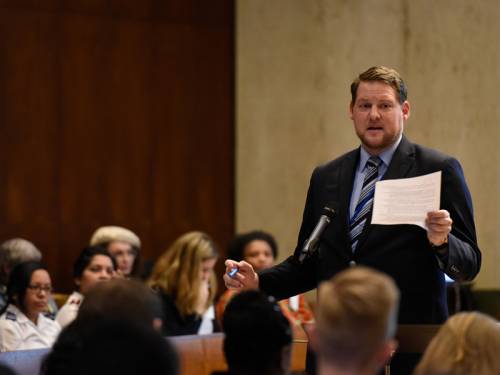Presbyterian Ministry at the United Nations regularly works with Geneva-based experts
by Rich Copley | Presbyterian News Service

Ryan D. Smith speaks in the Chapel at the Church Center at the United Nations in March 2019. (Photo by Rich Copley)
LEXINGTON, Kentucky — On Friday, an independent group of United Nations human rights experts released the sort of statement we are used to seeing about other nations.
“A group of independent UN human rights experts today called on the United States Government to take decisive action to address systemic racism and racial bias in the country’s criminal justice system by launching independent investigations and ensuring accountability in all cases of excessive use of force by police,” the statement began.
The experts went on to address recent events, including widespread incidents and protests saying, “We strongly condemn the killings of Ahmaud Arbery, Breonna Taylor and George Floyd, and call for systemic reform and justice. The latest videos to surface showing white men chase, corner, and execute a young man who was out jogging, or showing an officer kneeling with his weight on a man’s neck for eight minutes shock the conscience and evoke the very terror that the lynching regime in the United States was intended to inspire,” the experts said. “Given the track record of impunity for racial violence of this nature in the United States, Black people have good reason to fear for their lives.”
Ryan D. Smith, Director and Representative to the United Nations for the Presbyterian Ministry at the United Nations (PMUN), said he was struck by the number of signatories to the statement — more than two dozen — and its direct language.
“It says they look at the United States not as a shining beacon on a hill, but as a country with problems that it might need help solving,” Smith said on Monday.
The statement reaches back to note the recent 99th anniversary of the Black Wall Street Massacre in Tulsa, Oklahoma and the history of police participation in and leniency toward perpetrators of violence against people who are black. It also cites a 2016 UN report about racial bias in the United States justice system and official reaction to recent protests as points of concern.
“The experts also noted that the United States’ 1 June 2020 statement to deploy military force against protesters nationwide involves legal instruments used primarily against people of African descent, but rarely in their defense in similar situations,” the statement said. “The nearly simultaneous tear gassing of peaceful protesters not involved in unlawful behavior presents significant rule of law concerns.”
On Monday, Floyd family attorney Ben Crump asked the United Nations to investigate the circumstances of Floyd’s death and make recommendations for police reform. A number of Crump’s requests were addressed in the experts’ statement.
The PC(USA) UN office was not involved in crafting the statement, but Smith said the ministry does meet regularly with the Geneva-based experts when they come to New York.
“The Presbyterian Ministry at the United Nations’ role is being the church in the UN and the UN in the church,” Smith said. “We have been working with the UN human rights mechanism for a long time to bring the church’s perspective.”
Smith observed that the COVID-19 pandemic began as a global problem from the United States’ perspective until the pandemic became so bad here that the U.S. leads the world in infections and deaths. The recent deaths at the hands of police or people related to police — Arbery’s alleged assailants included a former police detective — and subsequent protests have underscored the point that reports of racism in the United States has reverberated beyond U.S. borders.
The Presbyterian Church (U.S.A.) has a number of ministries dedicated to addressing systemic racism and related issues, including Racial Equity & Women’s Intercultural Ministries and the PMUN’s fellow Compassion, Peace & Justice ministry, the Office of Racial & Intercultural Justice. Dismantling structural racism is also one of the three primary aims of the Presbyterian Mission Agency’s Matthew 25 invitation to Presbyterian organizations, churches and mid councils (synods and presbyteries).
“This is why having a church engaged with the international community is so important,” Smith said. The connection helps the world hear the perspective of the church in the U.S. and relays international concerns to the broader church.
Smith says, “To have this office as a connecting point goes a long way in our ministry.”
Resources
Racial Justice Resources from the PC(USA)
Facing Racism: a racial justice website from the PC(USA)
![]() You may freely reuse and distribute this article in its entirety for non-commercial purposes in any medium. Please include author attribution, photography credits, and a link to the original article. This work is licensed under a Creative Commons Attribution-NonCommercial-NoDeratives 4.0 International License.
You may freely reuse and distribute this article in its entirety for non-commercial purposes in any medium. Please include author attribution, photography credits, and a link to the original article. This work is licensed under a Creative Commons Attribution-NonCommercial-NoDeratives 4.0 International License.
Categories: Advocacy & Social Justice, Matthew 25, Peace & Justice
Tags: ahmaud arbery, ben crump, black wall street massacre, breonna taylor, compassion peace & justice, coronavirus, covid-19, george floyd, matthew 25 invitation, office of racial & intercultural justice, presbyterian ministry at the united nations, Racial Equity & Women’s Intercultural Ministries, ryan smith, united nations human rights experts
Ministries: Compassion, Peace and Justice, Presbyterian Ministry at the United Nations, Racial Equity & Women’s Intercultural Ministries, Matthew 25 in the PC(USA): Join the Movement